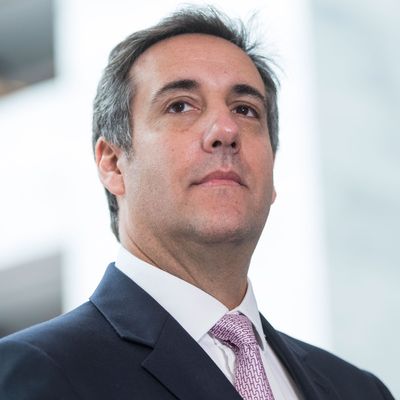
Until just before Donald Trump’s inauguration, Michael Cohen hoped that he’d be invited to join his boss in the White House. “He wasn’t expecting attorney general, but he was holding out for a senior job that would have also allowed him to continue being an attack dog for the president,” a source told the Daily Beast.
Cohen was reportedly left behind in New York at the urging of Ivanka Trump and Jared Kushner, and various others who thought it unwise to install the president’s self-described “fixer” in the West Wing. They were right (just imagine if we were learning that the White House counsel paid off various Trump paramours), but the decision is at the root of the latest scandalous Cohen revelations. Being “personal attorney” to a president who has teams of vastly more qualified lawyers left Cohen with a lot of time on his hands, so he began pursuing lucrative consulting offers. Ironically, Cohen was selling his knowledge of the Trump White House, which he’d just been shut out of.
Trump’s unexpected win left corporations scrambling for someone who could give them insight into how the new administration would operate, and anyone with real or perceived access to Trump had plenty of opportunities to cash in.
“Everyone was hiring ‘Trump whisperers’ in 2017 — every single hanger-on in the Trump orbit made a fortune in 2017,” one Republican consultant told Politico. “And not necessarily to influence them, just to try to figure out who are the right people to talk to.”
“The question was ‘Who is the real influence?’” the consultant said. “Is it Gary Cohn? Steve Bannon? Wilbur Ross? How do we get to Jared and Ivanka? Does anyone know Dina Powell? Does anyone listen to Steven Mnuchin? There’s no point talking to Reince Priebus, right? Every single client we had was trying to figure it out.”
Cohen portrayed himself as the one person who could answer these questions. One GOP strategist described his pitch to CNN: “I don’t know who’s been representing you, but you should fire them all. I’m the guy you should hire. I’m closest to the president. I’m his personal lawyer.”
It’s unclear how true this was even before Cohen was excluded from the White House. While he reportedly spoke to Trump several times per day during the transition, one source said Trump “never talked to Cohen about substantive matters” that corporations might be interested in.
Statements from several of Cohen’s clients suggest they pieced this together, but not before paying him millions of dollars. Through Essential Consultants, the limited liability corporation Cohen set up to pay Stormy Daniels, the Swiss drug company Novartis agreed to pay Cohen $1.2 million over the course of a year. On Wednesday the company said in a statement that it “believed that Michael Cohen could advise the company as to how the Trump administration might approach certain U.S. health-care policy matters, including the Affordable Care Act.”
After an initial meeting with Cohen, Novartis determined that he “would be unable to provide” those services, the company said, but since he could only be terminated for cause they opted to keep paying him until the contract ran out.
AT&T, which was pursuing a merger with Time Warner along with other business that required Trump-administration approval, hired Cohen “to provide insights into understanding the new administration.” The White House moved to block the deal anyway.
Aside from his consulting activities, Cohen also signed a $500,000 contract to work with Squire Patton Boggs, a large legal and lobbying firm that has deep connections to both parties in D.C. — but not the Trump team. A person at the firm familiar with the Cohen deal told the Washington Post that hiring him was “a no-brainer,” since it seemed having the president’s personal lawyer on board would be good “from an optics perspective” with the new administration.
Cohen only managed to refer five clients, and his year-long arrangement with the company was terminated in March. The New York Times reports that he mostly operated independently from the firm. While Boggs paid for his office, the firm did not have a key and he used his own separate computer server. The company said in a statement that Cohen merely “referred a handful of routine legal matters to the firm which were completely unrelated to his work for the president.” A source told the Post that he met with executives and attended meetings too, but the firm is now trying to downplay the relationship. “They paraded him to clients all those months,” the person said.
Though from what we’ve learned so far, it seems Cohen was particularly bad at guiding companies through Trumpworld, these sorts of arrangements aren’t uncommon. As the Daily Beast explains, good government refers to it as “shadow lobbying.”
It’s the practice of influencing policy and policymakers through activity informal enough to fall short of the legal definition of “lobbying.” An army of consultants, government relations executives, and “political intelligence” professionals earn tens, perhaps hundreds, of millions of dollars each year through such soft advocacy, and none of its activities are disclosed to the public.
At the very least, Cohen was fully submerged in the “swamp” his boss was ostensibly in D.C. to drain. It’s also possible that he should have registered as a lobbyist. But we still don’t know what exactly Cohen promised the companies, and whether he was able to deliver, which could constitute far more serious crimes. Did he, for instance, consult with a firm connected to a Russian oligarch to conceal payments for services requested by the Kremlin, or did he merely engage in shady but lawful exaggeration to dupe various companies into thinking he was the key to navigating the Trump White House?
Only time — and Robert Mueller, who’s apparently been looking into this for months — will tell.






























